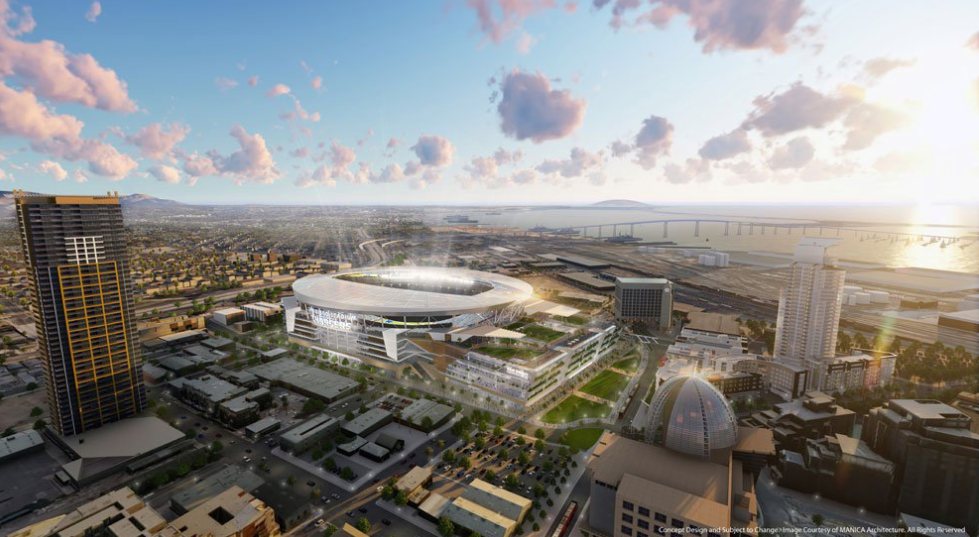San Diego mayor Kevin Faulconer has not issued his stance on a proposed Chargers stadium, prompting some lobbying from both sides of the issue.
To this point Faulconer has been silent on the issue, something that has become more glaring as the Chargers and groups opposed to the stadium/convention center initiative up their cases. The hotelier-run Tourism Marketing District commissioned a study that came out against the Chargers’ plan, stating that the joint stadium and convention center was not economically viable enough to justify a hotel tax increase of 12.5% to 16.5%. A Chargers’ commissioned study released in August ran counter to these claims, stating the proposal would increase the number of visitors to San Diego.
Recently a group of the city’s business leaders wrote a letter to Faulconer asking that he oppose the project. The letter, which can be read here, says that the initiative–labeled on November’s ballot as Measure C–contains too little information, carries a disproportionate risk to the city’s general fund, and goes against the desires of the city’s tourism industry. The Chargers, for their part, have received the endorsement of the local chamber of commerce.
Given the level of division within San Diego’s business community, Faulconer faces an interesting challenge. As Michael Smolens of the San Diego Union-Tribune observes, it requires a balance for a fiscally-conservative mayor that has sought to promote tourism development:
A fair amount has been said — well, by me anyway — about how supporting Measure C would seem contrary to the mayor’s tax-averse nature. He opposes an increased sales tax for countywide transportation projects (Measure A) and didn’t want a city mega-bond that would have raised property taxes to address the city’s huge infrastructure backlog.
But hotel taxes may be a different matter. He supported a plan for the hoteliers to essentially tax themselves (meaning their customers) to help expand the waterfront convention center, but it ran into a legal roadblock. Then in his state-of-the-city address he said he’d back a “legally defensible plan on the ballot to finance this project.”
That didn’t happen.
So on the hotel-tax front, his support of Measure C wouldn’t be inconsistent. Also, unlike the other taxes, this one mostly hits out-of-towners.
Meanwhile, there’s some thinking, as laid out in a column this past week by the Union-Tribune’s Nick Canepa, that a Faulconer endorsement would help facilitate new stadium negotiations after the November election. Yes, even some notable Measure C backers don’t think it stands a chance to gain the two-thirds majority needed for approval.
Certainly this requires some consideration from Faulconer. Either back a controversial plan that–as it stands–is unlikely to pass and ignite more consternation among business leaders and allies, or criticize the initiative and risk San Diego’s chances of keeping the Chargers through an alternate plan. Either way, the lobbying figures to continue until the mayor renders an opinion.
RELATED STORIES: Despite Study, Fans Tepid About Chargers Stadium; Chargers Pitch Fans on New Stadium With Emotional Video; Study Criticizes San Diego Chargers Stadium Proposal; Padres Express Reservations About Chargers’ Plan; Local Chamber Backs Chargers’ Stadium; With Case Still in Limbo, Chargers Boast Stadium Project; Chargers’ Stadium Proposal Faces Uphill Battle; Chargers Meet Signature Requirement; Court Ruling Looms; Chargers Likely Facing Two-Third Majority for Stadium Approval; Chargers: 111,000 Signatures Means November Vote on New Stadium; Chargers Push San Diego Downtown Stadium at Rally; Preliminary Chargers Stadium Design Renderings Released; City Attorney Criticizes Citizens’ Plan; Chargers Meeting With Citizens’ Plan Advocates;Convadium Facing Local Scrutiny; Chargers Begin Stadium Initiative; Chargers Pitch “Convadium”

